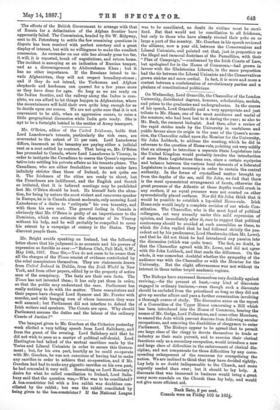On Wednesday, Lord Granville, the Chancellor of the London University,
distributed degrees, honours, scholarships, medals, and prizes to the graduates and undergraduates. In the course of his speech, Lord Granville paid a very appropriate and just tribute to Mr. Sheen, one of the most assiduous and useful of the senators, who had been lost to it daring the year; as also to Mr. Busk, the eminent biologist. And then, after a review of the rapid strides made by the University in usefulness and public favour since its origin in the year of the Queen's acces- sion, the Chancellor called upon the Member for the University, Sir John Lubbock, to address the meeting, which he did in reference to the question of Home-rule, pointing out very mildly that an attempt to introduce a separate State Legislature into the United Kingdom would probably involve the introduction of more State Legislatures than one, since a certain equipoise and balance between the various local elements of a federated Legislature is almost necessary in order to sustain the central authority. In the forms of crystallised matter brought up from the depths of the sea, said Sir John, we find that there is the most symmetrical arrangement of facets, otherwise the great pressure of the Atlantic at these depths would crush in any surface, if an equal pressure were not exerted on other symmetrically placed surfaces. Nor did Sir John think that it would be possible to establish a lop-sided Home-rule. Irish Home-rule would imply a complete revision of our whole Con- stitution. The Chancellor, who is the most loyal of political colleagues, eat very uneasily under this mild expression of opinion, and immediately after it, rose to suggest that political controversy should be avoided at such assemblies as these, to which Sir John replied that he had followed strictly the pre- cedent set by his predecessor, Lord Sherbrooke (then Mr. Lowe), and that he did not think he had introduced any passion into the discussion (which was quite true). The fact, no doubt, is that the Chancellor agreed with Mr. Lowe, and did not agree with Sir John Lubbock, and that made the difference. On the whole, it was somewhat doubtful whether the sympathy of the audience was with the Chancellor or with the Member for the University. But the slight effervescence was not without its interest in those rather torpid academic regions.


































 Previous page
Previous page